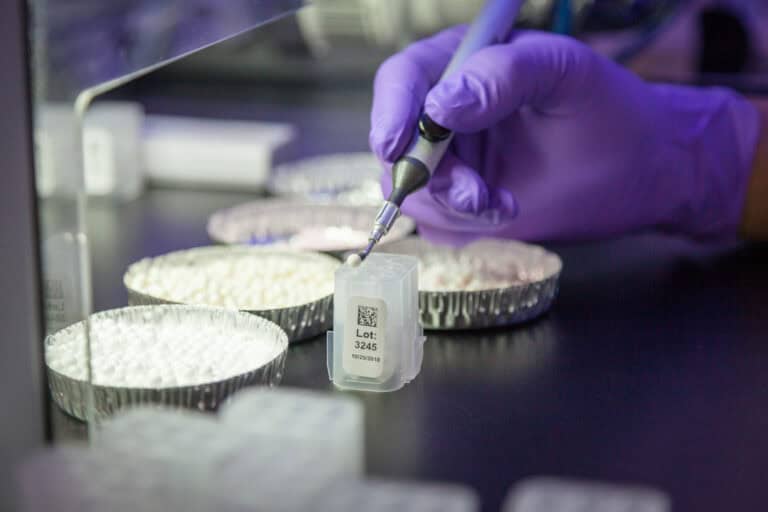Life Science Cold Chain Logistics
Life science companies, from reagents to diagnostics, rely on cold chain shipping. A vital component in the chain is the ubiquitous polystyrene cooler. Yet, with restaurant polystyrene bans growing in prevalence, it is likely a matter of time before traditional shipping coolers and packing peanuts come under fire. However, even while polystyrene remains legal, consumers and environmentally-conscious organizations are beginning to shy away from its use. How can life science cold chain-dependent companies adapt to this shift?
The overarching elimination of polystyrene is undoubtedly coming, the only question is when.
The Polystyrene Problem
Expanded polystyrene (EPS), generically referred to as “Styrofoam”, is a major source of negative environmental impact. Most temperature-controlled products are shipped in a bulky EPS container, which often ends up in a landfill due to the difficulty of recycling it. The large landfill waste that polystyrene creates, combined with concerns over potential toxicity, have led to major regulatory overhauls, with over 100 cities, so far, enacting bans on polystyrene containers. These bans primarily target restaurant takeaway boxes, but some also include packaging peanuts. With a continuing regulatory focus, shipping containers are a logical next step. If enacted, life science cold chain-dependent companies will be forced to find alternative methods to EPS. This could possibly occur in a short time frame, depending on the legislation.
Life science cold chain-dependent companies will be forced to find alternative methods to Styrofoam.
Additionally, environmentally-conscious consumers and companies are beginning to seek out suppliers that share their sustainability values. Calls for environmental impact labeling are gaining popularity in the food industry, and biotech is not far behind. California nonprofit My Green Lab has introduced an Accountability, Consistency, and Transparency (ACT) label program that is rapidly gaining support from industry giants including MilliporeSigma and Thermo Fisher Scientific. The ACT label rates products by their manufacturing, consumer use, and end-of-life impacts on the environment. As similar label strategies gain popularity, environmentally-unfriendly options including polystyrene will be cast into the spotlight. Life science companies can prepare now to substantially reduce the environmental impact of their cold chain.
Consider the 7R’s of the GSK waste hierarchy in your strategy:
- Reduce the mass of materials, complexity, and the life cycle of the packaging.
- Remove unnecessary materials or those with environmental concerns
- Reuse the components
- Recycle- Design for recyclability
- Renew- Increase the use of materials and energy from renewable resources
- Reward- Improve the environmental impact of the supply chain, accounting for the patient, customer, and consumer needs at a lower cost
- Respect- Use responsible suppliers
Solution: Alternative Life Science Cold Chain Materials
The simplest remedy to a Styrofoam ban is replacing it with comparable products. Indeed, several companies have already taken the initiative to do so, and numerous alternatives exist on the market. Biodegradable shipping container and packing alternatives are now available: made from corn, wool, wood, sugarcane, sorghum, and more. In a major step forward, life science leader Thermo Fisher Scientific has begun voluntarily rolling out 100% paper coolers to replace EPS in their cold chain. With life science leaders making the switch to reduce the environmental footprint of their cold chain, more companies will likely follow.
Life science companies can prepare now to substantially reduce the environmental impact of their cold chain.
However, polystyrene accounts for just a portion of the cold chain’s overall harmful effects. The vehicles used for cold shipments can emit up to 50 tons of CO2 per vehicle per year. Additionally, these products must be stored cold pre- and post-shipping, leading to high electricity usage and carbon footprint impact. If environmental impact labeling grows in popularity, simply switching cold chain shipping from EPS to another material may not be enough.
Solution: Eliminate the Cold Chain
If an environmentally-friendly cold chain is difficult for a company to achieve, removing it entirely may be the best path forward. Many life sciences products that ship via cold chain today can be enhanced by lyophilization, rendering them safe to transport under ambient conditions. Room temperature-stable lyophilized products eliminate the need for polystyrene shipping containers or cold chain vehicles and storage. Another sustainability advantage is the reduction in wasted product due to expiration, as lyophilization can often extend shelf life. Even if your company does not have access to in-house capabilities, outsourced lyophilization R&D and production is quick to implement. One company benefiting from outsourced lyophilization is leading OEM Integrated DNA Technologies (IDT):
“IDT recognizes the environmental and commercial advantages of lyophilization, which is why we have partnered with Argonaut to offer these services to our customers,” says Carly Hodges, General Manager of B2B at IDT.
Customers are now able to select ambient products for themselves and proactively eliminate their cold chain. Transitioning to ambient products now not only offers cold chain cost savings, it provides an edge over cold chain-dependent competitors who continue to use Styrofoam.
Many life sciences products that ship via cold chain today can be enhanced by lyophilization, rendering them safe to transport under ambient conditions.
The overarching elimination of polystyrene is undoubtedly coming, the only question is when. Whether your life science company plans to react by replacing it with alternatives or decides to eliminate the need for cold chain entirely, preparing now can offer a competitive advantage for your future.
Interested in lyophilization as a solution to your cold chain? Contact Argonaut to learn more about your options.


